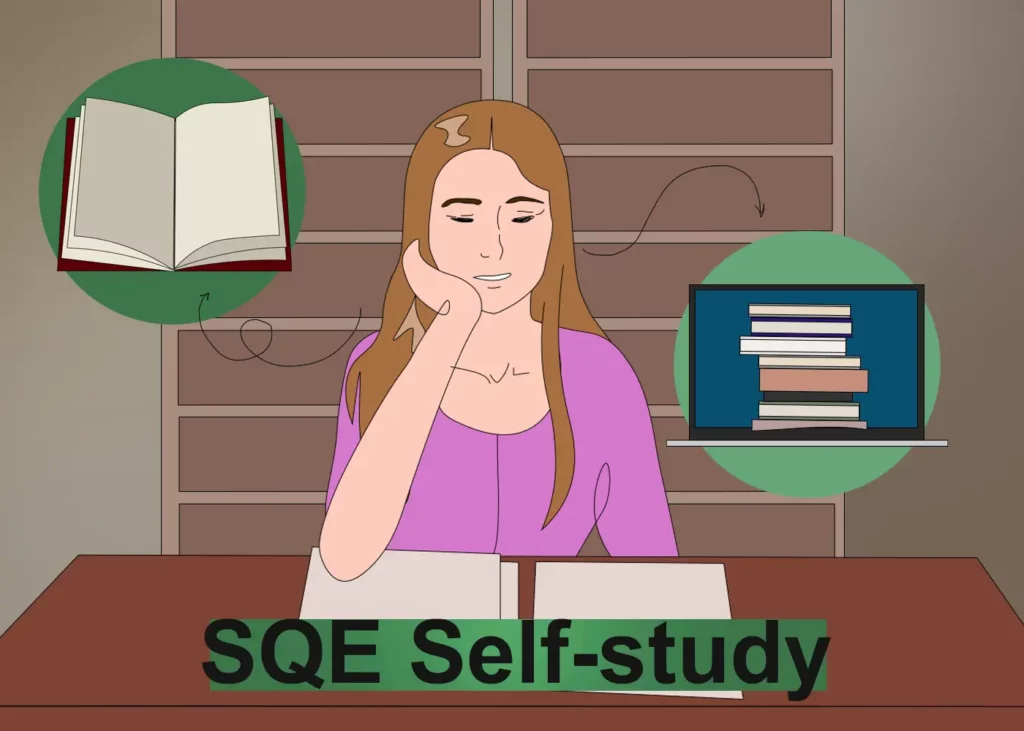
Overseas Student Looking to Qualify in the UK
Explore the journey of becoming a solicitor in the UK as an overseas student. Understand the SQE process, requirements, and essential tips for success.

Deciding between the SQE self-study and enrolling in an SQE preparation course can be a difficult choice. The idea of studying for the Solicitors Qualifying Examination (“SQE”) on your own might seem overwhelming initially. Here, we explain how it stacks up against the structured SQE preparation courses.
The SQE is among several requirements that future lawyers must fulfil to become a solicitor in England and Wales. Typically, the journey to becoming a solicitor begins with a university degree, but now there’s also the option of solicitor apprenticeships, where the SQE is studied towards the end while working. Your degree can either be a qualifying law degree (QLD), like an LLB, or in a non-law field, such as a BA in History or a BSc in Physics. For those with a non-law degree, it used to be common to take a conversion course (formerly the GDL, now called the PGDL) before proceeding. While this step isn’t mandatory anymore, it’s still strongly advised and often required by firms for those aiming to secure a training contract. We discuss the advantages and disadvantages of this route here. Following this, whether from a law or non-law background, you’ll advance to the final necessary step: passing the SQE exams.
After finishing the SQE, you must gain two years of qualifying work experience (QWE) before the Solicitors Regulation Authority (SRA) can officially recognise you as a solicitor. The updated SQE pathway offers flexibility in how you can acquire QWE – it can be undertaken in various types of organisations and at any stage of the overall qualification process.
The SQE itself consists of two sets of exams – SQE1 and SQE2.
SQE1 features two multiple-choice exams, aimed at assessing ‘functioning legal knowledge’ in selected areas:
FLK 1
FLK 2
In contrast, SQE2 concentrates on enhancing legal skills like research, advocacy, and drafting attendance notes. The skills are developed across the following topics:
The usual path to passing the SQE is through a SQE preparation course offered by different law schools in England and Wales. Some schools focus specifically on professional qualifications and have a lot of teaching sites, including in London and around the UK, like the SQE courses at The University of Law. There are also providers connected to regular universities, for example, the SQE courses at De Montfort University or Manchester Metropolitan.
A non-exhaustive list of SQE providers includes (in no particular order of preference):
Typically, these programs span about a year for full-time students and two years for those opting for SQE part time study.
In that duration, the teaching method closely mirrors that of a university setting, involving preparatory reading and exercises prior to a class, followed by seminars where SQE tutors discuss your responses in a group setting. Yet, a significant focus is placed on independent study time across these courses.
Many students consider self-studying for the SQE because formal courses can be expensive. The SQE was introduced, partly, to make it easier for people from different backgrounds to become solicitors.
The prices of courses can differ significantly, but for a course in London, you can expect to pay around £8,000-£12,000 for a full one-year preparation. This is usually divided into two packages: one for SQE1 preparation and one for SQE2 preparation, each costing approximately £5,000. Choosing to study at teaching centres outside of London could save you a few thousand pounds overall. Additionally, remote courses, which don’t include any in-person teaching, are generally slightly cheaper.
According to some students, it’s also important to factor in additional expenses when studying in London besides just course fees. Travel costs, particularly for train tickets, can significantly add to the overall financial load. Further, reportedly high rental prices in London make accommodation expenses another major consideration in budget planning.
It’s important to highlight that numerous providers offer discounted fees for students through SQE scholarship and bursary programs. Each provider may have varying offerings, which can be reviewed on their websites or clarified by contacting them directly. Typically, significant reductions in course fees can be obtained if you qualify for one of these opportunities. Available scholarships and bursaries often encompass both means-tested options, where financial need is demonstrated, and merit-based awards, which consider exceptional academic potential based on factors such as university attended and academic performance.
Studying for the SQE on your own is a cheaper option. But there are still some costs to keep in mind. These are usually included in the SQE prep course packages. For example, you’ll have to get your own SQE study materials. SQE Books can be really expensive, and you should expect to spend at least a few hundred pounds to get the right SQE books. You’ll also have to pay for all the exams yourself, which usually comes to around £3,000 to £4,000 in total (subject to change).
In short, you’ll save a lot of money compared to taking a prep course, but you’ll still need to come up with a fair amount of money.
Another significant concern for students, often leading them to consider a SQE prep course, is the challenge of self-learning the SQE content. In reality, teaching yourself many of the intricate legal concepts covered in the SQE can be quite demanding, especially when compared to receiving instruction from experienced SQE tutors. Successfully putting together a SQE self-study program requires exceptional discipline and independence to cover all the content thoroughly. However, there is an increasing abundance of affordable online SQE resources available to assist in navigating the content.
In summary, opting for a SQE prep course is certainly the more established approach to SQE study, particularly given the newness of the course. However, SQE self study is also feasible provided you possess an exceptionally high degree of self-discipline and organisation.
Almost every aspiring solicitor who has obtained a training contract will be enrolled in SQE prep courses by their sponsoring law firms automatically, often covering their tuition fees as well. Most firms do appear to favor the assured minimum standard of instruction provided by prep courses, which they know their students will receive, and therefore tend to favor candidates who opt out of the self-study approach.
It’s important to recognise that your experience at an SQE provider goes beyond just studying the academic curriculum. You’ll also gain from the strong connections many of these institutions have with law firms, as well as networking opportunities with fellow students, tutors, and access to career advisors.
As previously stated, undertaking self-study for the SQE demands a variety of soft skills, including independence, organisation, and consistency. Moreover, your current CV could serve as a guide, either steering you towards or away from self-study.
Individuals who have prior experience in the legal field (albeit not as fully qualified lawyers) may have already accumulated significant on-the-job legal knowledge. This may put them in a position of being more prepared than others for SQE exams, requiring only a slight supplement of knowledge that might make prep courses seem excessively demanding. These individuals may include paralegals or chartered legal executives.
In brief, deciding whether to pursue self-study for the SQE is a personal decision that hinges on your individual circumstances. This entails evaluating the advantages and disadvantages at hand. As discussed in this article, factors worth considering include cost (which tends to favor self-study), quality of education (which often favors prep courses), and career background/future aspirations. If you’re still uncertain, seeking guidance from industry professionals can offer valuable insights. Seeking trusted advice is always advisable.

Explore the journey of becoming a solicitor in the UK as an overseas student. Understand the SQE process, requirements, and essential tips for success.

The Solicitors Regulation Authority (SRA) has announced significant changes in how scores for the SQE1. Read here to find out more.

Discover the art of balanced SQE preparation as we explore the synergy between traditional SQE books and focused SQE notes.

Understanding SQE Mitigating Circumstances: This informative post offers insights into the special considerations and exemptions within the SQE framework.
Introducing Brigitte’s FLK – An online SQE supplementary learning and revision resource to help you in your understanding and application for the SQE preparation course and SQE exam. Founded from the same trusted author of Brigitte’s Notes and Brigitte’s LPC.
Copyright © 2024 Brigitte’s FLK | Brigitte’s FLK is not sponsored or endorsed by any college or university
